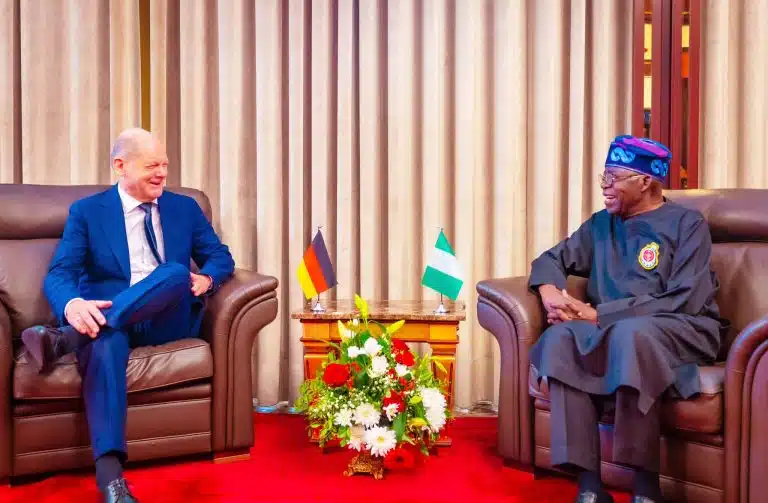The German Chancellor, Olaf Scholz came to Nigeria on a state visit on Sunday 29th October in keeping with his promise to President Bola Ahmed Tinubu during the G20 Summit in India two months ago. Germany is Europe’s biggest economy with a huge manufacturing sector that contributes 20% to its $3.4 trillion GDP. This manufacturing sector is built around cheap oil and gas principally from Russia.
With the war in Ukraine and the Western sanctions slammed on Russia’s energy sector, it has significantly impacted on Germany’s gas supply from Russia. Prior to the war, Germany relied heavily on Russian gas imports, which accounted for around 55% of its total gas supply. However, since the start of the war, Russian gas supplies to Germany have been significantly reduced, and in some cases completely cut off.
This has led to an increase in prices and shortages in supply, with Germany having to search for alternative sources of gas, including liquefied natural gas (LNG) from other countries. The immediate effect of this is a significant rise in energy costs for German consumers and businesses. To secure gas supply, Germany has been forced to turn to countries like the US, Qatar, for LNG, which is more expensive than Russian pipeline gas due to the distance and additional infrastructure costs needed to deal with LNG imports from overseas.
Africa and Nigeria particularly is a potential major source of gas supply to Germany. While Nigeria is a major gas producer, it is not currently a major source of gas for Germany. This is partly due to the fact that Nigeria’s LNG facilities are relatively new and are still developing their capacity. In addition, transporting LNG from Nigeria to Germany would be expensive due to the distance and lack of infrastructure.
However, as the global LNG market continues to evolve, it is possible that Nigeria could become a more competitive source of gas for Germany in the future. With the visit of the German Chancellor and his powerful delegation to Nigeria on Sunday, that future may already be closeby. While the exact details of the bilateral discussions between President Bola Ahmed Tinubu and Chancellor Olaf Scholz is not yet known, both countries have revealed that discussion touched on gas heavily.
During the 2023 presidential election campaigns, President Bola Ahmed Tinubu as candidate of the APC repeatedly echoed his determination to take advantage of our enormous gas reserves and make Nigeria competitive in the global gas market. He called for the West to spare some funds to invest in pipelines that would transport gas from Nigeria to Europe. It is obvious he is now walking the talk.
There are plenty reasons to be upbeat about Nigeria’s imminent gas revolution. First, the AKK Gas pipeline project is nearing completion and is expected to be delivered in 2024. This critical gas infrastructure project started by the Buhari administration is laying the foundation for increased gas utilization by companies and businesses in Northern Nigeria and would open doors for construction of gas-fired power plants up north.
This 614km AKK pipeline will also be part of the trans Saharan gas pipeline that will run from Warri in Delta State to Hassi R’Mel in Algeria with a section of the pipeline passing through Niger Republic. In Hassi R’Mel gas from the trans Saharan pipeline can then be pumped through the undersea Trans-Mediterranean Pipeline to Europe or loaded onto Liquefied Natural Gas tankers for export to European countries.
This is a huge project with the total length of the pipeline projected at 4,128 kilometres. 1,037 kilometres of the pipeline will be in Nigeria (the 614km AKK pipeline is part of this length). The pipeline project is estimated to cost $13 billion and could send up to 30 billion cubic metres of gas annually to Europe, with German a major potential customer.
Nigeria has the world’s 8th largest gas reserve and the largest in Africa with a proven natural gas reserve of 5.91 trillion cubic meters. The country produced 40.4 billion cubic meters of natural gas in 2022. By contrast, Algeria, which has lower gas reserves than Nigeria produced 100 billion cubic meters of natural gas in the same 2022 and exported roughly half of that quantity. There is therefore a huge gap for Nigeria to fill in terms of gas production if we are to fully take advantage of our enormous gas resources.
This trans Saharan gas pipeline is therefore a huge opportunity for Nigeria to take a massive leap in gas production/export and a partnership with Germany, which is desperately trying to diversify its gas sources in the face of the Ukraine war couldn’t have come at a more auspicious time. It becomes even more significant for Nigeria as we seek ways to increase inflows of foreign exchange into the country to stabilise our currency and provide Nigeria with the enormous revenue backbone to tackle our massive infrastructural deficit as well as our human capital development needs.
It is anticipated that the visit of the German Chancellor to Nigeria underscores the readiness of Germany and German investors to facilitate the realisation of the trans Saharan gas pipeline project through provision of the needed funding and technical partnership. The project immediately unlocks for Nigeria and other countries involved in the project, a big avenue to expand its economic base, create jobs and generate massive revenues.
When you juxtapose the prospects of this trans Saharan pipeline project with the ongoing construction of train 7 of the NLNG terminal in Bonny Island estimated to cost $6.5 billion and which would increase the capacity of the Bonny NLNG from 22mtpa to 30mtpa, in addition to the value chain that will spring up along the corridor of the AKK pipeline in terms of gas utilization, jobs creation and revenue for government as well as the CNG revolution underway following the fuel subsidy removal, then it is safe to confidently declare that Nigeria’s Decade of Gas has truly begun.

